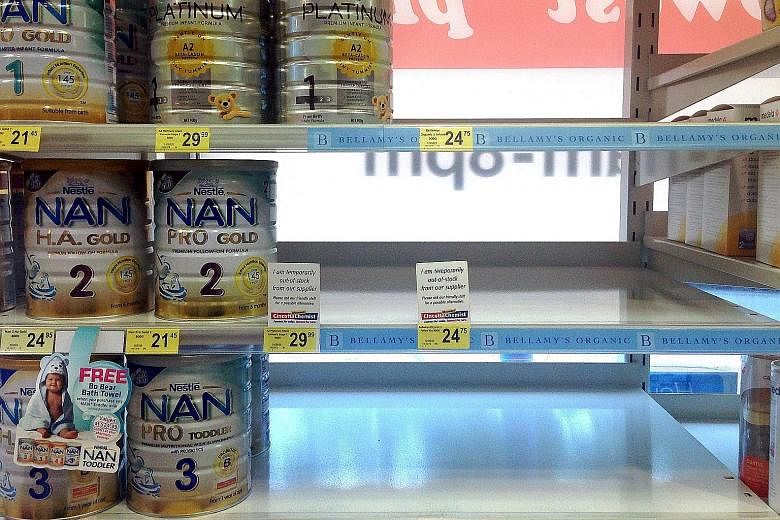At souvenir shops aimed at Chinese tourists in Australia, the range of cuddly koalas and toys has been joined by an unlikely new product: baby milk formula.
The formula has become a popular item for international visitors, believed to be mainly foreign students and tourists from China, who buy in bulk to send the milk back home. Some have reportedly received up to A$190 (S$193) in China for a tin of high-grade formula that costs just A$25 to A$30 in Australia.
But the so-called "grey market" has caused public outrage in Australia after it led to a shortage of milk formula in shops and prompted supermarkets to tighten quotas on how much each customer can buy.
Major supermarket chains Coles and Woolworths have limited sales of in-demand brands to two to four tins per customer. And as the shortage grew in recent weeks parents said they could not feed their babies.
"Since two months it's been so bad that I cannot secure one or two tins of the product in one go ever," Sydney mother Sudharshama Varadarajan, who has a 16-month-old daughter, told ABC News.
Ms Varadarajan said she had been driving to every supermarket within a 20km radius to search for formula and checking five or six times a day if she could buy it online.
In Australia, it is not illegal for customers to stockpile formula, or for visitors to send it home or for souvenir and small grocery shops to sell it.
But as local anger grew, some parents posted videos and photos online showing customers buying dozens of tins of formula at a time.
A mother who lives near Canberra, Ms Lizzie Cann, said she was close to running out of the three types of formula she needs for her eight-month-old son, who has a rare bowel condition.
Like many of the other affected mothers, Ms Cann said she cannot produce enough of her own breast milk to feed her child.
"If we can't get him food quick enough, that can put him into a crisis. The hospital is even on standby for him if we can't get it," she told The Canberra Times.
She said the last time she bought a tin online, it cost about A$35 but now it is about A$150. "You don't have a choice, your baby is going to dehydrate without it."
Australian premium milk formula and other dairy products are considered high quality and have become a prized product in China since a formula milk scandal in 2008.
Almost 300,000 Chinese children became ill and at least six died after dairy company Sanlu sold contaminated formula.
Some analysts said the recent demand was prompted by a belief among some parents in China that high-grade Australian formula could turn children into prodigies.
"Formula marketers have tapped into this desire to falsely claim their products enhance brain development and health," Dr Karleen Gribble, a nursing expert at Western Sydney University, told Fairfax Media.
"Child prodigies and sports stars abound in marketing campaigns, and hospitals are recruited to promote formula brands to new mothers in hospitals."
It is believed the rush heightened ahead of China's Singles Day mass shopping event last week.
The federal government said it could not restrict a business' decision about which customers to sell the formula milk to.
Still, despite the fury in Australia, the rush for formula milk has given a boost to dairy farmers.
Shares in a2 Milk, which sells formula directly to China via a Shanghai sales team and about 25 local distributors, have soared by more than a third, from 65 cents to 90.5 cents in just six weeks.
The company said on Tuesday that revenue from formula milk sales was set to outstrip income from its traditional milk product.

